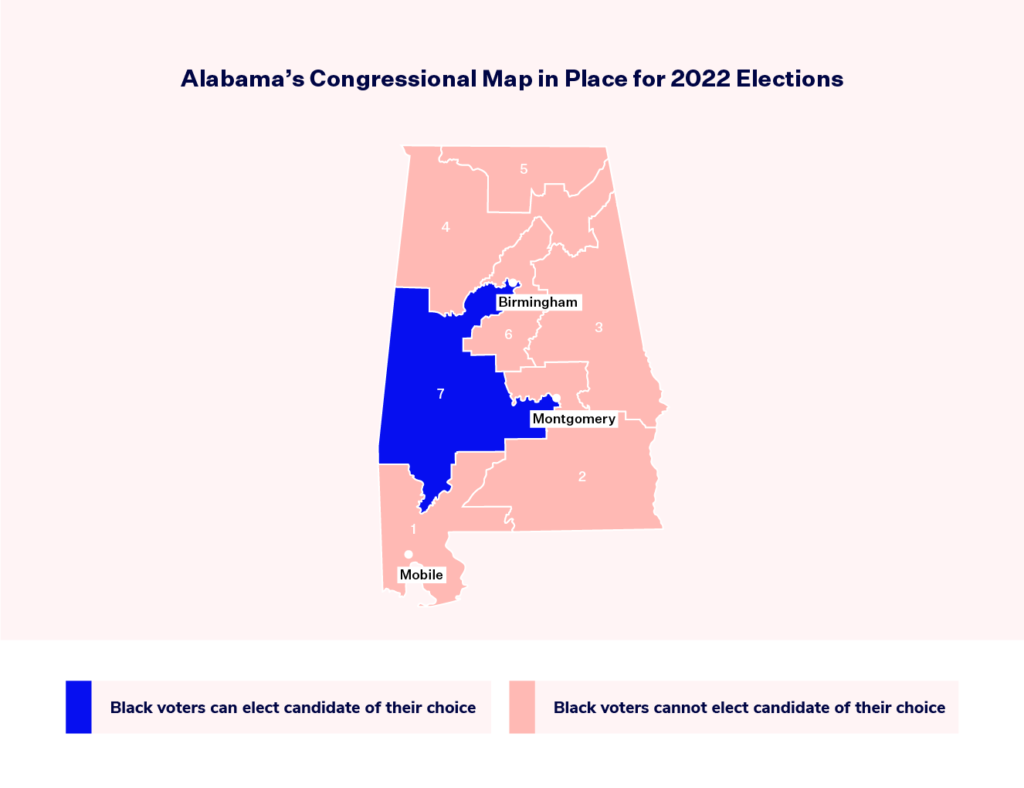Alabama Congressional Redistricting Challenge (SCOTUS)
Allen v. Milligan
Lawsuit decided by the U.S. Supreme Court regarding a challenge to Alabama’s congressional map drawn with 2020 census data under Section 2 of the Voting Rights Act (VRA). Two lawsuits (Caster v. Merrill and Milligan v. Merrill, now consolidated under Allen) were originally filed on behalf of voters and non-profit organizations who allege Alabama’s current congressional map dilutes the voting strength of Black Alabamians in violation of Section 2 of the VRA. After a district court blocked the map and ordered the creation of a new map with two majority-Black districts, the Supreme Court stepped in and paused this order, ensuring that the state’s previously blocked map — which only contains one majority-Black district — is in place for the 2022 elections. On Jan. 16, 2023, Wes Allen (R) was sworn in as secretary of state; as a result, the case caption changed from Merrill v. Milligan to Allen v. Milligan.
On June 8, the U.S. Supreme Court issued a 5-4 decision that leaves Section 2 of the VRA intact and affirmed the lower court’s decision that struck down the state’s congressional map. Litigation over the map will continue in the district court.
On Sept. 5, a federal court blocked the implementation of Alabama’s new congressional map — enacted by the state’s Republican governor and passed by the Republican-controlled Legislature — that does not have a second majority-Black district. State officials once again appealed to the Supreme Court and asked it to reinstate Alabama’s new, noncompliant congressional map as litigation continues, but the Court declined to do so on Sept. 26, 2023.
On Sept. 29, state officials withdrew their appeal of the Sept. 5 decision. On Oct. 5, a federal court picked Alabama’s new congressional map drawn by a court-appointed special master for the 2024 elections. The plan has two districts — the 2nd and 7th Congressional Districts — where Black voters will have the opportunity to elect candidates of their choice.

Additional Information
This lawsuit was filed in federal court on behalf of voters, Greater Birmingham Ministries and the Alabama State Conference of the NAACP challenging Alabama’s new congressional map drawn with 2020 census data. The complaint alleges that race was the predominant factor used to draw districts without a compelling VRA or other governmental interest in violation of the 14th Amendment. Specifically, the complaint argues that Black voters were “packed” into the 7th Congressional District and “cracked” among three other districts in order to avoid drawing a second district where Black voters could elect their candidate of choice. A three-judge panel was appointed to hear the Milligan plaintiffs’ claims (since they brought a constitutional challenge to the map), which blocked the use of the map and ordered the creation of a new map that contains two majority-Black districts in order to comply with the VRA. The state went to the U.S. Supreme Court via its shadow docket asking it to pause the lower court’s order, which the court granted. This means that Alabama’s previously blocked map with only one majority-Black district will be in place for the 2022 elections. The Milligan plaintiffs’ 14th Amendment claim is not before the U.S. Supreme Court.
Lawsuit filed on behalf of multiple Black Alabama voters challenging the state’s new congressional map drawn with 2020 census data. The lawsuit argues that the new map intentionally dilutes the voting strength of Black Alabamians by only creating one majority-Black district when a second one could also be drawn in violation of Section 2 of the VRA, which prohibits any law that is intended to or results in the “denial or abridgement of the right of any citizen of the United States to vote on account of race or color.” A preliminary injunction was granted by a district court judge (compared to the Milligan plaintiffs, the Caster plaintiffs were only before one district court judge, who was simultaneously part of the three-judge panel hearing Milligan) that blocked the use of the map and ordered the creation of a new map that contains two majority-Black districts in order to comply with the VRA.
While the state’s appeal in Caster would normally go through the standard appeals process, due to the overlapping nature of the claims with Milligan, it also wound up before the U.S. Supreme Court. Learn more about how redistricting cases wind up before the court here.

Both the Milligan and Caster parties argue the current map dilutes the voting power of Black voters in violation of Section 2 of the VRA, which prohibits vote dilution. They argue that the plan dilutes the electoral strength of Black Alabamians by “packing” Black voters into the 7th Congressional District and “cracking” Black voters among three other districts in order to avoid drawing a second district where Black voters could elect the candidate of their choice. The Milligan and Caster parties attest that the district court correctly established that Alabama’s electoral processes are “not equally open” to Black voters in violation of Section 2 of the VRA. Oral argument before the U.S. Supreme Court was held on Oct. 4, 2022.
Case Documents (2023 Proposed remedial Plans)
Case Documents (U.s. supreme court)
Milligan Case Documents (11th Circuit)
Caster Case Documents (11th CIrcuit)
Milligan Case Documents (district court)
Caster Case Documents (district court)
transcripts from preliminary injunction hearing
Last updated: